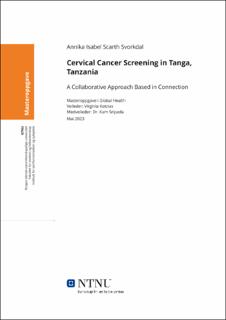| dc.description.abstract | Cervical cancer is a significant global health issue, it is among the most common causes of death for women around the world. The greatest cervical cancer cases occur in lower-middle income countries where there is a lack of resources to support cervical screening and follow-up care. There is a need for research that explores the nature of international partnerships and collaborative factors that contribute to cervical cancer prevention in low-resource settings.
This qualitative study examines the experience of clinicians working in an international collaboration, with Canadians and Tanzanians, to implement cervical screening and follow-up care in Tanga, Tanzania. The 2023 study aimed to gain insight into the factors that impact the strength and sustainability of their collaborative project. An iterative method using both focus group (n = 8) and key-informant interviews (n = 3) was used to explore the perspectives of Canadian and Tanzanian collaborators.
Participants highlighted the factors that, in their experience, contributed to a strong foundation for a collaborative relationship including a focus on local priorities, trust and reliability, shared decision-making, care for patients and partners, and a genuine interest in learning. Logistical factors such as their intentional integration into the existing clinical structure, budgeting with consideration for community needs, and documentation tools such as record books and visual care paths supported their work. The reflections of participants who have worked together in a long-term mentorship, sponsorship, and partnership contributed valuable knowledge regarding the establishment of strong, sustainable collaborations in the prevention of cervical cancer in Tanga, Tanzania.
Keywords: Cervical cancer prevention, cervical screening, women’s health promotion, cross-cultural partnership, global health, HIC-LMIC collaboration, clinician’s perspective, cervical cancer burden, Tanga, Tanzania | |
